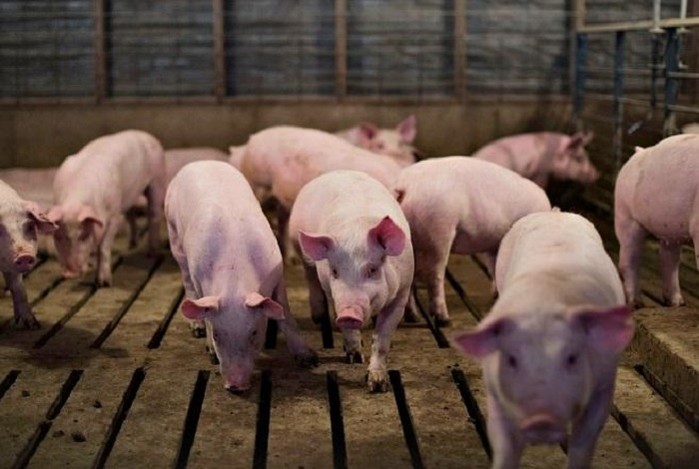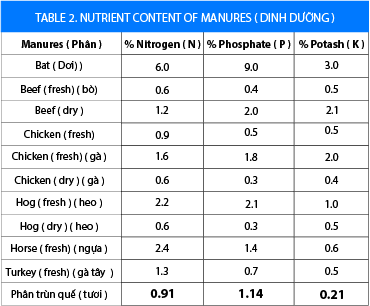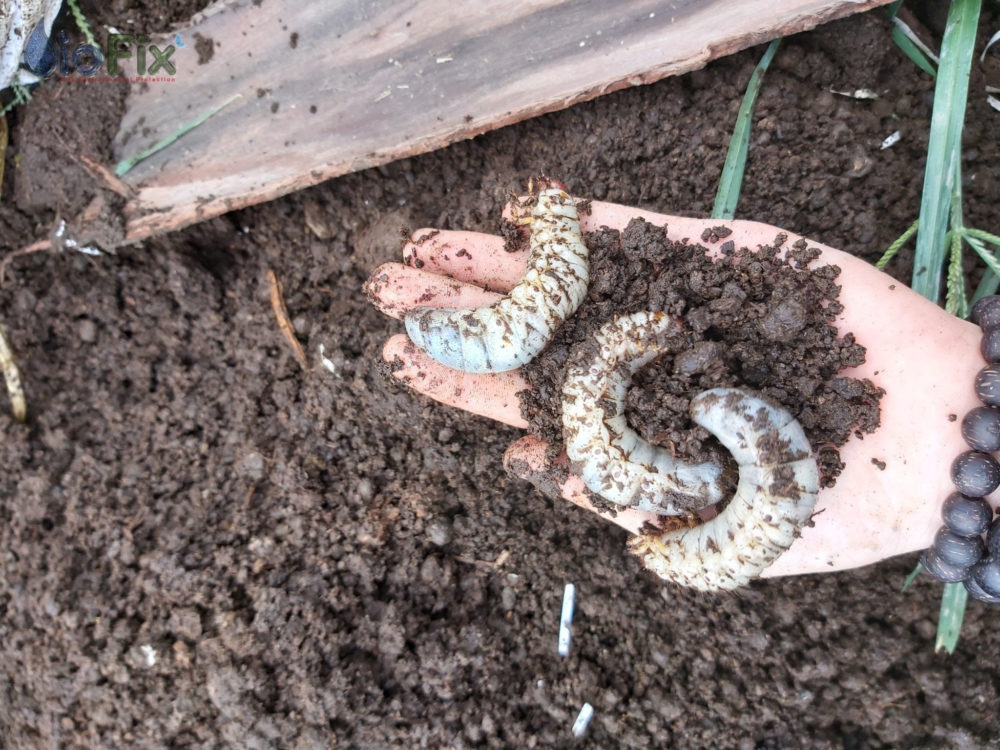The most effective way to compost manure
What is manure?
Manure is the waste produced by livestock. Manure is a mixture mainly of: manure, livestock urine and bedding (vegetables, grass, straw, rice straw ...), organic waste and green manure ... composted by traditional methods or using biological products for composting.

Nutrient composition of manure
The quality of manure depends on the type of livestock and the method of making manure. Some of these factors are:
Amount of litter
Type of manure and urine of livestock
How livestock is cared for
Type of feed fed to livestock
Method of composting manure
In general, the nutrient composition of manure is described in the table below:

Amount of litter
Type of manure and urine of livestock
How livestock is cared for
Type of feed fed to livestock
Method of composting manure

Effects of manure on crops
Provide nutrients (macrominerals, medium minerals, trace elements), organic humus ... to increase soil fertility
Support and stimulate the development of beneficial microorganisms
Improve resistance to pests, harsh conditions ... of crops
Support the strong development of plant roots, increase the efficiency of chemical fertilizer use
Create a good living environment to help beneficial organisms develop: such as earthworms, beneficial microorganisms ...
Why should manure be composted with biological products
Composting manure is an extremely necessary measure before fertilizing the fields. The use of fresh manure (raw manure) often causes loss of nutrients in the cultivated soil. Here are some reasons why manure should be composted with biological products: Manure contains toxic residues such as stimulants, antibiotics, disinfectants, pathogenic bacteria and other organic elements. Many of these toxins can be removed through composting with high temperature biological products. Therefore, it is recommended to apply proper composting techniques to decompose and eliminate the above residues before using them as fertilizer for vegetables.

Some fresh manures contain large amounts of nitrogen and mineral salts. When applied to cultivated crops, these mineral salts can have the same effect as over-application of chemical fertilizers. In excess amounts, they can burn the roots of young plants, reduce their resistance to pests and diseases, and reduce the shelf life of agricultural products. When applied properly, composting will convert animal manure, bedding materials, and other raw products into organic humus, a relatively stable, nutrient-rich component that supports chemical reactions, found in fertile soils. Some fresh manures contain large amounts of nitrogen and mineral salts. When applied to cultivated crops, these mineral salts can have the same effect as over-application of chemical fertilizers. In excess quantities, they can burn the roots of young plants, reduce their resistance to pests and diseases, and reduce the shelf life of agricultural products. When applying the correct composting process, it will convert animal manure, bedding materials, and other raw products into organic humus, a relatively stable, nutrient-rich component that supports chemical reactions, found in fertile soils.
How to compost manure with biological products
Principle of the method: Add beneficial microorganisms that can decompose organic humus, deodorize, balance nutrients in manure, etc., helping plants absorb easily and balance nutrients for the soil, preventing the soil from being easily leached of nutrients.
Effects of biological products in the composting process
Inhibit and destroy pathogenic microorganisms, fungal spores, and worm eggs during the composting process
Deodorize, reduce pollution, and protect the environment
Inhibit and destroy pathogenic microorganisms, fungal spores, and worm eggs during the composting process
Deodorize, reduce pollution, and protect the environment
Bài viết liên quan

Propagating the Circular Economy Model in Military Units
BioFix Fresh joins in propagating the circular economy model, a military hold event to share biotech solutions for organic and wastewater treatment.
05-06-2025

BioFix Fresh Promotes Circular Economy at Navy Brigade 167
BioFix Fresh participated in promotes circular economy at Navy Brigade 167 and the event to share biotech solutions for organic and wastewater treatment.
05-06-2025

BioFix Fresh tổ chức thành công Seminar "Kỷ nguyên sinh học trong dịch vụ lưu trú" tại Đà Nẵng
BioFix Fresh tổ chức thành công Seminar "Kỷ nguyên sinh học trong dịch vụ lưu trú" tại Đà Nẵng
05-06-2025

BioFix Fresh attends VITAS' 25th anniversary celebration
BioFix Fresh tham gia lễ kỷ niệm 25 năm thành lập VITAS
05-06-2025

Summary of effective and thorough fat treatment methods
Is your drainage system clogged with grease giving you a headache? Check out these effective and thorough grease removal methods that are commonly used.
14-11-2024

Grease-treating microorganisms - effective treatment of clogged pipes
Learn about grease-treating microorganisms - the most effective solution for unclogging pipes today. Suggest some microbial preparations that are highly effective in treating grease.
14-10-2024

The most effective way to compost manure
Manure is an organic fertilizer from livestock and poultry manure, often mixed with straw. This fertilizer helps improve soil fertility, provide nutrients for plants, and improve soil structure.
26-07-2024

What is SVI? The role of SVI in wastewater treatment
What is SVI? SVI is the sludge volume index commonly used to measure the characteristics of a mixture of sludge and water or activated sludge (unit is milliliters/gram).
26-07-2024

What is a septic tank? Why periodically add probiotics to a septic tank?
Septic tanks are places that contain solid waste (such as feces, urine, grease, and some other organic waste, etc.) and this waste will be decomposed in the septic tank into liquid form.
26-07-2024

Wastewater treatment technologies
Scientists have found many advanced wastewater treatment technologies. Applicable to many different types of wastewater.
26-07-2024

What is anaerobic biotechnology? How does it work?
Anaerobic biotechnology is a method of using anaerobic microorganisms and facultative microorganisms to decompose organic and inorganic substances in wastewater.
26-07-2024

Impact of excess oil and grease on the wastewater treatment system
Fats, oils and grease from cooking (vegetable oil, meat, milk) enter the drain through the sink, solidifying and causing blockages, broken drains and wastewater treatment problems.
25-07-2024

Operating principle of microbial fat treatment
The habit of pouring grease and leftover food directly into the sink repeatedly every day causes excess grease under the drain pipe to increase, combined with leftover food to clog the drain pipe.
25-07-2024

















